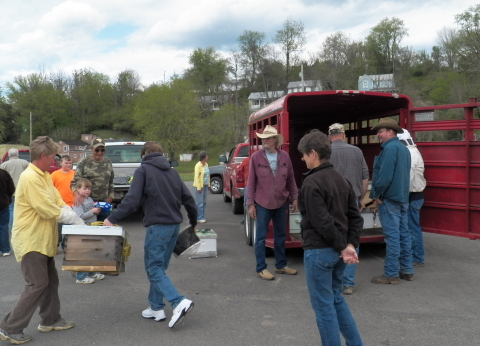THANK AMERICAS BEEKEEPERS FOR STALLING HONEYBEE APOLOCLYPSE - West Central Beekeepers Lead Regional Effort


(Top) West Central Beekeepers Association president Dale
Cunningham, of Calhoun, unloads full beehives after delivery
to Spencer; (bottom) Beekeepers collect their hives at delivery
By Bob Weaver
Americans, over the years, seem more concerned about the politics and corporate interests of the environment than the environment itself, the earth, water and air that sustains life itself.
Also widely ignored, life on earth is sustained by the cross-pollination of bees, mostly honeybees.
The US honeybee population has been in major decline, sometimes referred to a "Beemageddon," with bees dying, putting honey production and $15 billion worth of pollinated food crops in jeopardy.
Now, thanks to US beekeepers, it has been reversed, at least for now, with the establishment of honeybee colonies.
West Central Beekeepers Association president Dale Cunningham says the local group has been establishing 50-60 new colonies a year.
The group works to encourage new beekeepers and promote best practices.
The situation has been so dire that that the White House put forth the first National Strategy to Promote the Health of Honey Bees and Other Pollinators, a 64-page policy framework for saving the nation's bees, butterflies and other pollinating animals.
Now, honeybee colonies have actually risen since 2006, from 2.4 million to 2.7 million in 2014.
The honeybee is surviving, thanks to USA beekeepers, said Cunningham.
Cunningham acknowledged the efforts generally go unnoticed, saying "Locally, with new and old beekeepers, we have planted flowering trees at the county park, put out hundreds of new fruit trees and more recently sowed 1,500 packets of wildflowers.